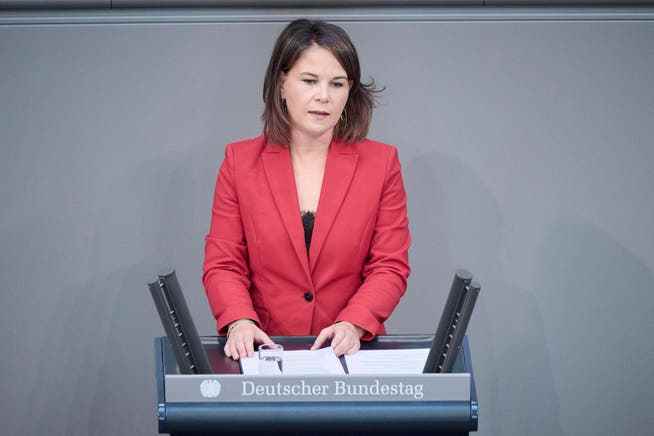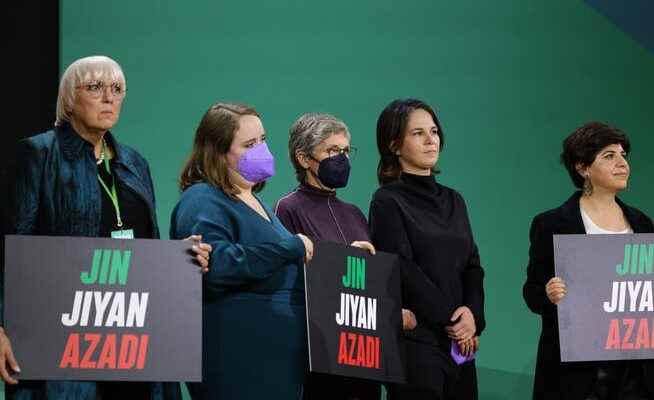Germany must sharpen its stance on the Islamic Republic if it does not want to lose its credibility.
Foreign Minister Annalena Baerbock (2nd from right) and other Green politicians during a speech by an Iranian actress on October 15 in Bonn.
«Iran is the test. And we’re failing this test right now.” This was recently told in a confidential context by a dissatisfied foreign politician from the traffic light coalition governing Berlin. It was about the attitude of German Foreign Minister Annalena Baerbock to the ongoing protests in the Islamic Republic and her credo of a “feminist foreign policy”.
According to recently published survey almost half of Germans have never heard of a “feminist foreign policy”. Only about a tenth knows what the term means. The realignment of Berlin’s foreign policy under Baerbock remains a bubble phenomenon with no real substance. In the past eight weeks, the Foreign Minister would have had countless opportunities to fill a “feminist foreign policy” with life.
Because the courageous people in Iran have been demonstrating against the repressive theocracy for eight weeks. This responds with beatings, imprisonment, executions and live ammunition. The protests were triggered by the death of 22-year-old Mahsa Amini after she was arrested by the vice squad for wearing a headscarf incorrectly. The protests continue, with women at the forefront. Anyone who only reacts half-heartedly to this historical situation, as the Federal Foreign Office is doing, can no longer speak credibly of a “feminist foreign policy”.
Application for self-assessment
Last Wednesday, the traffic light factions brought one Application to support the protest movement in Iran into the Bundestag. However, the application that was later accepted remains a document of self-assurance. The parliamentary groups in the federal government confirm that they are putting enough pressure on the Tehran regime, and further sanctions are being “examined”.

Not very convincing: Foreign Minister Annalena Baerbock speaks in September in the Bundestag on the situation in Iran.
It is worth remembering that Germany is Iran’s largest European trading partner. The regime in Tehran still sees Germany as a possible partner with whom it shares “historical ties” as the Iranian foreign minister wrote on Twitter on Thursday. Berlin would have the opportunity to sanction Tehran even more.
On Monday, the EU foreign ministers in Brussels are expected to add 31 more people and institutions from Iran to the sanctions list. Baerbock is committed to ensuring that the UN Human Rights Council deals with the Iranian crackdown on the protests. That’s good and right. But Berlin is not ready to take a more important step: the nuclear agreement with Iran should not be buried, nor should the negotiations be tied to further conditions.
Page 4 of the application reads: “A failure of the negotiations (. . .) would be an immense and unpredictable danger for the entire region, which would particularly affect our partner Israel.” While has just repeatedly urged the Israeli government to drop the negotiations.
Negotiations give Tehran legitimacy
Critics will object that the nuclear deal is not a gift to Iran, but also serves legitimate German and European interests: Iran should not receive a nuclear bomb. But the agreement is the wrong way to achieve this goal.
After former US President Donald Trump withdrew from the agreement in 2018, Tehran continued to enrich uranium. Even with a successful conclusion, the regime will be difficult to trust. And do you really want to lift sanctions against Iran right now, as the agreement would provide?
In addition, Iranian drones are destroying Ukraine’s civilian infrastructure these days. By supplying arms to the Kremlin, the regime in Tehran is violating Germany’s immediate security interests in Europe.
The deadlocked negotiations on the nuclear agreement are of little use, but the costs are increasing. While Iran is terrorizing its own population and indirectly also the Ukrainians, the negotiations give it additional legitimacy. Nevertheless, the federal government wants to stick to the nuclear agreement, not set any new negotiation conditions and continue to trade with Tehran. That is not courageous and strategically far-sighted. Not particularly feminist either.
